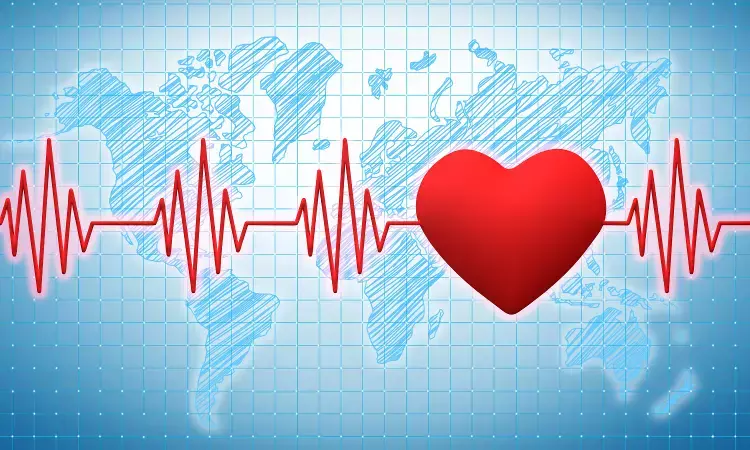- Home
- Medical news & Guidelines
- Anesthesiology
- Cardiology and CTVS
- Critical Care
- Dentistry
- Dermatology
- Diabetes and Endocrinology
- ENT
- Gastroenterology
- Medicine
- Nephrology
- Neurology
- Obstretics-Gynaecology
- Oncology
- Ophthalmology
- Orthopaedics
- Pediatrics-Neonatology
- Psychiatry
- Pulmonology
- Radiology
- Surgery
- Urology
- Laboratory Medicine
- Diet
- Nursing
- Paramedical
- Physiotherapy
- Health news
- Fact Check
- Bone Health Fact Check
- Brain Health Fact Check
- Cancer Related Fact Check
- Child Care Fact Check
- Dental and oral health fact check
- Diabetes and metabolic health fact check
- Diet and Nutrition Fact Check
- Eye and ENT Care Fact Check
- Fitness fact check
- Gut health fact check
- Heart health fact check
- Kidney health fact check
- Medical education fact check
- Men's health fact check
- Respiratory fact check
- Skin and hair care fact check
- Vaccine and Immunization fact check
- Women's health fact check
- AYUSH
- State News
- Andaman and Nicobar Islands
- Andhra Pradesh
- Arunachal Pradesh
- Assam
- Bihar
- Chandigarh
- Chattisgarh
- Dadra and Nagar Haveli
- Daman and Diu
- Delhi
- Goa
- Gujarat
- Haryana
- Himachal Pradesh
- Jammu & Kashmir
- Jharkhand
- Karnataka
- Kerala
- Ladakh
- Lakshadweep
- Madhya Pradesh
- Maharashtra
- Manipur
- Meghalaya
- Mizoram
- Nagaland
- Odisha
- Puducherry
- Punjab
- Rajasthan
- Sikkim
- Tamil Nadu
- Telangana
- Tripura
- Uttar Pradesh
- Uttrakhand
- West Bengal
- Medical Education
- Industry
High levels of Trimethylamine-N-oxide increase risk of cerebral infarction and mortality in AF patients

In individuals with atrial fibrillation, high levels of trimethylamine-N-oxide (TMAO) are related with an increased risk of cardiovascular death and cerebral infarction, says an article published in BMJ Heart.
Trimethylamine-N-oxide is a metabolite produced by the microbial breakdown of dietary phosphatidylcholine and carnitine, followed by hepatic oxidation. Marco Luciani and colleagues undertook this study to investigate its function in the prediction of adverse outcomes in a vulnerable group, specifically patients with atrial fibrillation, due to its prothrombotic and inflammatory processes.
Liquid chromatography-tandem mass spectrometry was used to quantify baseline TMAO plasma levels in 2379 participants from the ongoing Swiss Atrial Fibrillation cohort. At the outset, 1722 people had brain MRIs. Participants were tracked prospectively for four years (Q1-Q3: 3.0-5.0) and classified into TMAO tertiles at the start. To account for risk variables, linear and logistic mixed effect models and Cox proportional hazards were used.
The key findings of this study were:
1. In comparison to patients in the lowest tertile, subjects in the highest TMAO tertile were older, had worse renal function, were more likely to have diabetes, and had a greater prevalence of heart failure. 89.1%, 94.0%, and 88.2% of individuals, respectively, used oral anticoagulants (from high to low tertiles).
2. When baseline variables were taken into account, Cox models revealed higher overall mortality and cardiovascular mortality in the highest tertile compared to the lowest tertile.
3. On MRI, participants in the highest tertile were more likely to have tiny non-cortical infarcts and more likely to have copious, massive, non-cortical and cortical infarcts (log-transformed volumes; exponentiated estimate 1.89, 95% CI 1.11 to 3.21, p=0.02).
Reference:
Luciani, M., Müller, D., Vanetta, C., Diteepeng, T., von Eckardstein, A., Aeschbacher, S., Rodondi, N., Moschovitis, G., Reichlin, T., Sinnecker, T., Wuerfel, J., Coslovsky, M., Camici, G. G., Lüscher, T. F., Kuehne, M., Osswald, S., … Beer, J. H. (2023). Trimethylamine-N-oxide is associated with cardiovascular mortality and vascular brain lesions in patients with atrial fibrillation. In Heart. BMJ. https://doi.org/10.1136/heartjnl-2022-321300
Neuroscience Masters graduate
Jacinthlyn Sylvia, a Neuroscience Master's graduate from Chennai has worked extensively in deciphering the neurobiology of cognition and motor control in aging. She also has spread-out exposure to Neurosurgery from her Bachelor’s. She is currently involved in active Neuro-Oncology research. She is an upcoming neuroscientist with a fiery passion for writing. Her news cover at Medical Dialogues feature recent discoveries and updates from the healthcare and biomedical research fields. She can be reached at editorial@medicaldialogues.in
Dr Kamal Kant Kohli-MBBS, DTCD- a chest specialist with more than 30 years of practice and a flair for writing clinical articles, Dr Kamal Kant Kohli joined Medical Dialogues as a Chief Editor of Medical News. Besides writing articles, as an editor, he proofreads and verifies all the medical content published on Medical Dialogues including those coming from journals, studies,medical conferences,guidelines etc. Email: drkohli@medicaldialogues.in. Contact no. 011-43720751


